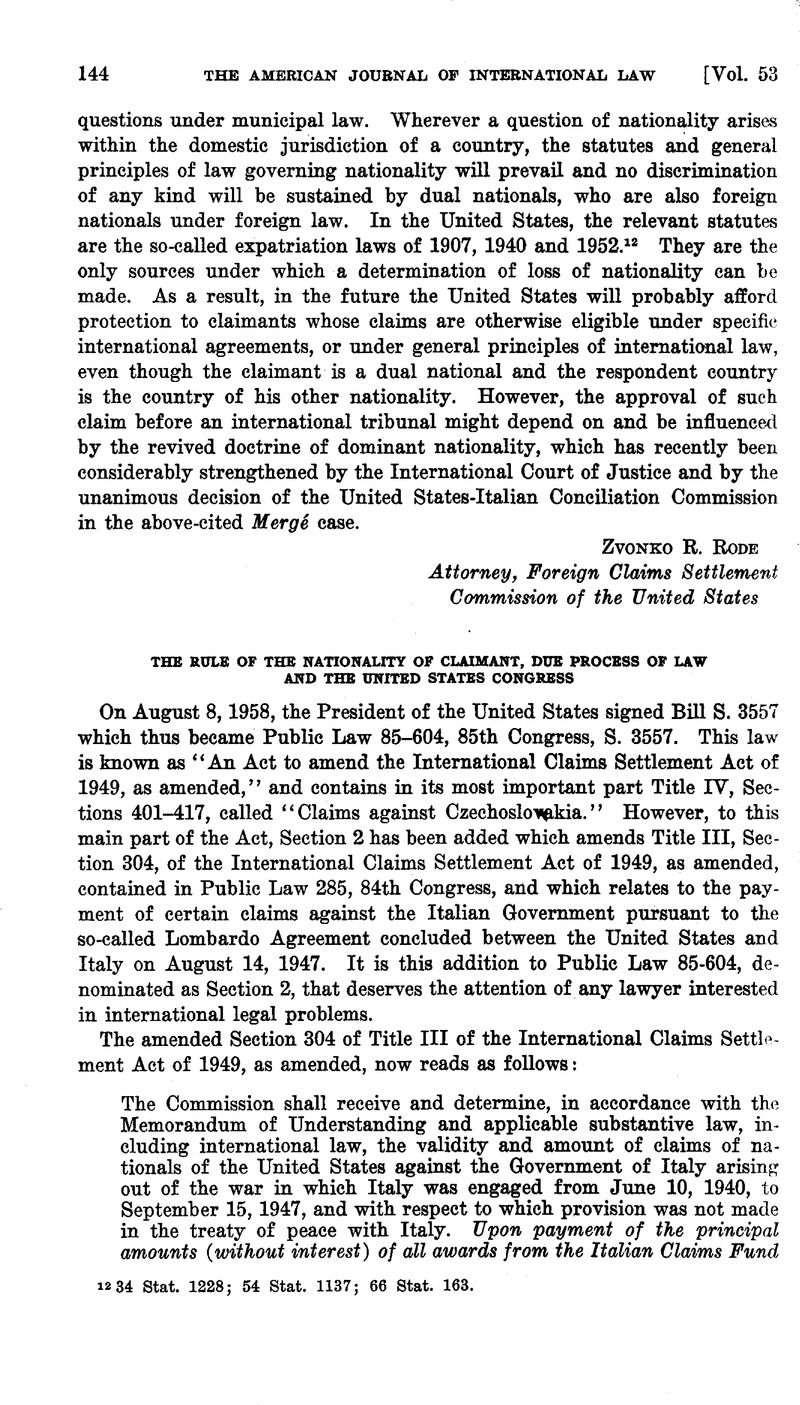No CrossRef data available.
Published online by Cambridge University Press: 28 March 2017

1 Report No. 2227, 85th Cong., 2nd Sess., House of Representatives, The Czechoslovakian Claims Fund, July 18, 1958, p. 14. The amended text is in italics.
2 See 5 Haekworth, Digest of International Law 802 ff.; also 2 Hyde, International Law 893 ff. (2nd ed., 1945); 1 Whiteman, Damages in International Law 94 ff. For an opposite opinion see Wormser, Collection of International War Damage Claims 38 ff. (1944). The principle of the nationality of claimant was also affirmed on two occasions by the International Court of Justice. See Panevezys-Saldutiskis Railway Case, Judgment of Feb. 28, 1939, Series A/B, No. 76, pp. 16 ff.; also Nottebohm Case, Judgment of April 6, 1955, [1955] I.C.J. Rep. 20-26.
3 For a complete text of the Lombardo Agreement, see 42 A.J.I.L. Supp. 152 (1948).
4 Such a broad interpretation to the Lombardo Agreement was given by Senator Long in the Senate debate. He said that “the Italian Government has been willing to make funds available not only to American citizens who, as of a particular date, had claims against Italy, but also to make available funds, over and above that amount, which might be due under other claims of this sort.” Cong. Record, Senate, “Vol. 104, No. 114, July 9, 1958, p. 12027.
5 Foreign Claims Settlement Commission, Hearings before the Committee on Foreign Affairs, House of Representatives, on Draft Legislation to amend the International Claims Settlement Act of 1949, as amended, and for other purposes, pp. 109-110.
6 Cf. Rode, “The International Claims Settlement Commission of the United States,“ 47 A.J.I.L. 615 ff. (1953), and also above, p. 139; Drucker, , “Compensation for Nationalized Property: British Practice,” 49 A.J.I.L. 477 ff. (1955).Google Scholar
7 Czhechoslovakian Claims Fund, Hearing before the Subcommittee on Foreign Economic Policy of the Committee on Foreign Affairs, House of Representatives, on H.R. 11840, S. 3557 and S. 979, pp. 30-31.
8 Ibid. 10.
9 Cong. Record, cited note 4 above, pp. 12027-12030.
10 Ibid. 12028.
11 lbid.
12 Ibid. 12028-12029.
13 Ibid. 12029.
14 Report No. 2227, cited note 1 above, p. 10.
15 The Commission based its decision on the following authorities: 3 Whiteman, Damages in International Law 1924 (1943) ; Borchard, The Diplomatic Protection of Citizens Abroad 428 (1928) ; 5 Hackworth, Digest of International Law 735 (1943); 6 Moore, Digest of International Law 1028; Wormser, Collection of International War Damage Claims 216 (1944); and Mixed Claims Commission, United States and Germany, Administrative Decision No. Ill , pp. 66-67.
16 Cf. 1 Hackworth, op. tit. 10.